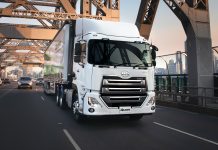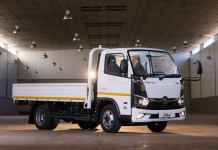Transportation is a major contributor to CO2 emissions globally, accounting for about 24% of total emissions come from this important sector. Of this figure, more than 75% is from road transportation in the form of cars, trucks and motorbikes. Surprisingly, the aviation sector only accounts for 11% of emissions here, while passenger cars account for 60% of road transportation emissions globally. Electric mobility (e-mobility), paired with renewable energy generation, stands to play a major role in significantly lowering global CO2 emissions in the transportation sector. This will not only help us achieve our global targets, but have a positive impact on the environment and our quality of life due to reduced pollution and noise.
After a decade of rapid growth, the global electric vehicle (EV) stock hit the ten million mark in 2020, reports the International Energy Agency (IEA), which represents an astonishing 43% increase over 2019. China has the largest fleet with 4.5 million electric cars, with Europe recording the largest annual increase last year of 3.2 million. Globally, governments spent US$14 billion on direct purchase incentives and tax deductions for electric cars in 2020, a year-on-year increase of 25%.
Not to be outdone with accelerating developments in the EV market worldwide, the Department of Trade, Industry and Competition published a Green Paper entitled ‘The South African Road to Production of Electric Vehicles’ on 18 May 2021. It aims to establish a clear policy foundation to coordinate a long-term strategy to position South Africa at the forefront of advanced vehicle and vehicle component manufacturing, complemented by a consumption leg. It will likely boost our competitiveness in the global race to transition from the internal combustion engine era into e-mobility solutions and technologies.
This follows the Minister of Trade, Industry and Competition challenging major South African automotive manufacturers in 2019 to assist to develop a roadmap for local EV production. The various workstreams of the automotive industry’s Master Plan were launched shortly thereafter, including a focus on technology changes and deeper localisation. The draft Green Paper aims to develop a framework upon which a comprehensive and long-term automotive industry transformation plan on new energy vehicles (NEV) can emerge, with a specific focus on the creation of a high-yielding business environment. This includes an appropriate fiscal and regulatory framework that will make South Africa a leading, highly competitive location for EV production, not only in Africa but globally.
Another focus is the development and investment in new energy vehicle (NEV) component technology and expansion of the fledgling electric supply chain; reinvestment and support towards reskilling and upskilling of the workforce to ensure the right skills are available for the design, engineering and manufacturing of EVs and related components and systems; the transition of South Africa towards cleaner fuel technologies available globally; and adoption of new and sustainable manufacturing processes to significantly reduce greenhouse gas emissions and improve our environmental wealth.
In a research note on the current EV market in South Africa, Old Mutual notes that the current charging network is still very small, and that it is going to take a long time before there is a widespread distribution of charging points. However, the larger issue is that a charging network is only as good as its power supply. More specifically, a large network of frequently used charge points needs a reliable industrial-strength power supply. Old Mutual notes: “Much would need to be done to ensure that the national grid has the capacity to cope with the petrol-to-electric switch, and energy producers and government need to anticipate and prepare for higher energy demands.”
Therefore, it is readily apparent the e-mobility market segment requires integrated charger and electrical infrastructure architectures that can be rapidly deployed. Here ABB leads the way to a zero-emission mobility future. With its mission and purpose to power e-mobility going forward, ABB engineers the electrification solutions for the transport of tomorrow, today. It ranges from smart transportation solutions from EV chargers for the home and electrified fleet depots and opportunity charging for electric bus and trucks to high-power chargers for the highway stations of the future.
ABB’s modular building block approach with integrated communication allows for scalable, repeatable designs for fast implementation in the rapidly developing EV market globally. One particular scalable solution to build depot charging infrastructure, for example, is our eFleet depot solution. Here the combination of modular blocks provides the solution architecture that meets the demand of modern eBus depots. On the other hand, the roadside relocatable EcoFlex with integrated high-power chargers is ideal for highway and public commercial parking. It allows for up to two 350 kW chargers in a relocatable enclosure: A 20-foot enclosure with up to four 175 kWHP cabinets, AC/DC, two 350 kW charge posts and an optional 50 kW DC fast charger.
The EV Site System (EVSS) provides integrated control and management between the chargers, electrical infrastructure and customer systems for seamless operation. The OPC UA protocol provides open communication and common interfaces. ABB chargers have integrated systems for connection to customers’ operating systems. EVSS allows for connection to other architectures (battery energy storage system or a MV feeder plus transformer) for easy transition to future needs.
A decade ago, the concept of autonomous driving and full EV fleets was very much a vision. It is fast becoming a reality, with ABB leading the way in developing new technologies and integrated solutions to drive our EV future. ABB entered the EV charging market in 2010 when it launched its pioneering DC charger. Now more than 14 000 ABB DC fast chargers are sold across more than 80 countries, from Peru to Rwanda. ABB is a global market leader in e-mobility charging solutions, with a strong market share in Europe, Asia Pacific and the US.
In 2013, ABB was the first company to develop networks of 50 kW chargers, spanning complete nations. This was paired with a unique cloud-based service for remote monitoring and servicing of chargers, which was a real game changer for connectivity, and now forms part of the ABB Ability™ ecosystem. More recently in 2018, ABB was first-to-market with its liquid-cooled full 350 kW capable charging technology, which delivers higher power and charging speeds. Early 2020 saw the acquisition of Chinese EV charging provider Chargedot, giving ABB a stronger entry into the largest e-mobility market in the world and broadening its portfolio of DC and AC fast charging.
ABB offers a total EV charging solution from compact, high-quality AC wallboxes and reliable DC fast-charging stations with robust connectivity to innovative on-demand electric bus-charging systems, with infrastructure solutions that meet the needs of the next generation of smarter mobility. In addition, ABB also offers Connected Services through its ABB Ability™ platform to allow charging station owners to monitor and configure charge points remotely, adapt business and pricing models over time, keep charging infrastructure up-to-date with the latest software, service the equipment efficiently and with minimal operational effort, increase charger uptime and the reliability of the charging network, and minimise investment in IT infrastructure and back-end software.
The faster we transition to EVs, the bigger the change will be, and the more stakeholders and OEMs we expect to enter this burgeoning market. We will also see the merging of two worlds, where the automotive world becomes part of the electrical world. In the past, these were two distinct industries, but in the next ten years we will see them coming together to offer a better user experience.
ABB developing new e-mobility technology
Transportation is a major contributor to CO2 emissions globally, accounting for about 24% of total emissions come from this important sector. Of this figure, more than 75% is from road transportation in the form of cars, trucks and motorbikes. Surprisingly, the aviation sector only accounts for 11% of emissions here, while passenger cars account for 60% of road transportation emissions globally. Electric mobility (e-mobility), paired with renewable energy generation, stands to play a major role in significantly lowering global CO2 emissions in the transportation sector. This will not only help us achieve our global targets, but have a positive impact on the environment and our quality of life due to reduced pollution and noise.
After a decade of rapid growth, the global electric vehicle (EV) stock hit the ten million mark in 2020, reports the International Energy Agency (IEA), which represents an astonishing 43% increase over 2019. China has the largest fleet with 4.5 million electric cars, with Europe recording the largest annual increase last year of 3.2 million. Globally, governments spent US$14 billion on direct purchase incentives and tax deductions for electric cars in 2020, a year-on-year increase of 25%.
Not to be outdone with accelerating developments in the EV market worldwide, the Department of Trade, Industry and Competition published a Green Paper entitled ‘The South African Road to Production of Electric Vehicles’ on 18 May 2021. It aims to establish a clear policy foundation to coordinate a long-term strategy to position South Africa at the forefront of advanced vehicle and vehicle component manufacturing, complemented by a consumption leg. It will likely boost our competitiveness in the global race to transition from the internal combustion engine era into e-mobility solutions and technologies.
This follows the Minister of Trade, Industry and Competition challenging major South African automotive manufacturers in 2019 to assist to develop a roadmap for local EV production. The various workstreams of the automotive industry’s Master Plan were launched shortly thereafter, including a focus on technology changes and deeper localisation. The draft Green Paper aims to develop a framework upon which a comprehensive and long-term automotive industry transformation plan on new energy vehicles (NEV) can emerge, with a specific focus on the creation of a high-yielding business environment. This includes an appropriate fiscal and regulatory framework that will make South Africa a leading, highly competitive location for EV production, not only in Africa but globally.
Another focus is the development and investment in new energy vehicle (NEV) component technology and expansion of the fledgling electric supply chain; reinvestment and support towards reskilling and upskilling of the workforce to ensure the right skills are available for the design, engineering and manufacturing of EVs and related components and systems; the transition of South Africa towards cleaner fuel technologies available globally; and adoption of new and sustainable manufacturing processes to significantly reduce greenhouse gas emissions and improve our environmental wealth.
In a research note on the current EV market in South Africa, Old Mutual notes that the current charging network is still very small, and that it is going to take a long time before there is a widespread distribution of charging points. However, the larger issue is that a charging network is only as good as its power supply. More specifically, a large network of frequently used charge points needs a reliable industrial-strength power supply. Old Mutual notes: “Much would need to be done to ensure that the national grid has the capacity to cope with the petrol-to-electric switch, and energy producers and government need to anticipate and prepare for higher energy demands.”
Therefore, it is readily apparent the e-mobility market segment requires integrated charger and electrical infrastructure architectures that can be rapidly deployed. Here ABB leads the way to a zero-emission mobility future. With its mission and purpose to power e-mobility going forward, ABB engineers the electrification solutions for the transport of tomorrow, today. It ranges from smart transportation solutions from EV chargers for the home and electrified fleet depots and opportunity charging for electric bus and trucks to high-power chargers for the highway stations of the future.
ABB’s modular building block approach with integrated communication allows for scalable, repeatable designs for fast implementation in the rapidly developing EV market globally. One particular scalable solution to build depot charging infrastructure, for example, is our eFleet depot solution. Here the combination of modular blocks provides the solution architecture that meets the demand of modern eBus depots. On the other hand, the roadside relocatable EcoFlex with integrated high-power chargers is ideal for highway and public commercial parking. It allows for up to two 350 kW chargers in a relocatable enclosure: A 20-foot enclosure with up to four 175 kWHP cabinets, AC/DC, two 350 kW charge posts and an optional 50 kW DC fast charger.
The EV Site System (EVSS) provides integrated control and management between the chargers, electrical infrastructure and customer systems for seamless operation. The OPC UA protocol provides open communication and common interfaces. ABB chargers have integrated systems for connection to customers’ operating systems. EVSS allows for connection to other architectures (battery energy storage system or a MV feeder plus transformer) for easy transition to future needs.
A decade ago, the concept of autonomous driving and full EV fleets was very much a vision. It is fast becoming a reality, with ABB leading the way in developing new technologies and integrated solutions to drive our EV future. ABB entered the EV charging market in 2010 when it launched its pioneering DC charger. Now more than 14 000 ABB DC fast chargers are sold across more than 80 countries, from Peru to Rwanda. ABB is a global market leader in e-mobility charging solutions, with a strong market share in Europe, Asia Pacific and the US.
In 2013, ABB was the first company to develop networks of 50 kW chargers, spanning complete nations. This was paired with a unique cloud-based service for remote monitoring and servicing of chargers, which was a real game changer for connectivity, and now forms part of the ABB Ability™ ecosystem. More recently in 2018, ABB was first-to-market with its liquid-cooled full 350 kW capable charging technology, which delivers higher power and charging speeds. Early 2020 saw the acquisition of Chinese EV charging provider Chargedot, giving ABB a stronger entry into the largest e-mobility market in the world and broadening its portfolio of DC and AC fast charging.
ABB offers a total EV charging solution from compact, high-quality AC wallboxes and reliable DC fast-charging stations with robust connectivity to innovative on-demand electric bus-charging systems, with infrastructure solutions that meet the needs of the next generation of smarter mobility. In addition, ABB also offers Connected Services through its ABB Ability™ platform to allow charging station owners to monitor and configure charge points remotely, adapt business and pricing models over time, keep charging infrastructure up-to-date with the latest software, service the equipment efficiently and with minimal operational effort, increase charger uptime and the reliability of the charging network, and minimise investment in IT infrastructure and back-end software.
The faster we transition to EVs, the bigger the change will be, and the more stakeholders and OEMs we expect to enter this burgeoning market. We will also see the merging of two worlds, where the automotive world becomes part of the electrical world. In the past, these were two distinct industries, but in the next ten years we will see them coming together to offer a better user experience.















